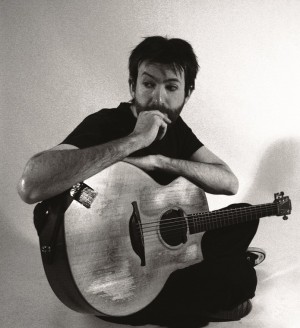One-Man Symphony: Jon Gomm
GALO: What about an idea beginning with a riff?
JG: I can’t really write starting from a riff. I have the riff but I don’t have any lyrics or anything to write about. I’m not AC/DC. I can’t write a riff and then put some cool words about hot chicks over the riff. I wish I could [laughs], because that is awesome. That’s amazing music but I don’t know how to do that. I’d feel ridiculous on stage; I’m not that kind of person. But they are a great band.
GALO: When you write a lyric what ideas do you usually concentrate on?
JG: Sometimes, I will write about what singer/songwriters tend to write about, like relationships and introspective songs. I do that sometimes but that’s a big trap that people can fall into. It’s almost like it was in the ’50s, when every song was a love song. So, I try to avoid that trap. I consider myself a “folk” musician, even though the music I play isn’t in the folk genre. I’m a troubadour. I travel around; I play my guitar and sing to people in little pubs. That’s what I do, so I consider it folk. I write about my environment, which is what you should do as a folk musician. I write about things that have happened to me in my life but I also write about politics; I write about war. The last song that I wrote was about the riots that happened here in Britain, but I haven’t recorded that song yet. I try to write about all kinds of things. I try to.
GALO: What about performing in America? Have you toured over here yet?
JG: No, I haven’t; not yet. We’re looking for next year. I’m trying to find the best way. It’s very difficult. All my friends who play in America, particularly solo performers, talk about how difficult it is. If you come to America to work, you’re a fucking immigrant. You’re an immigrant. [Laughs] You have to have so many visa applications; you have to say, “Yeah, I’m not a terrorist.” You have to fill out all these forms and then they can just reject your application. I know a lot of musicians who can’t work in America because they can’t get the temporary working visa. There’s a big wall around your country.
GALO: I see that ReviewCentre.com dubbed you the “new Hendrix.” What do you think?
JG: I don’t know what ReviewCentre.com is, or who wrote that, but that’s ridiculous. [Laughs] Jimi Hendrix is one of my complete guitar gods, my idol; a genius. I think he was underrated as a songwriter as well. I think he was a wonderful singer, and he didn’t even think that. He’s one of those guys, when you listen to his songs, you feel like you know him a little bit. I put personal things in my lyrics as well, so I try to transmit a personality and individuality in my songs. There are a lot of things about Jimi Hendrix that I aspire to, but I don’t want to be the new Hendrix because that’s ridiculous [laughs].
GALO: I prefer the one-man symphony idea I saw somewhere.
JG: I like that, it sounds nice. It sounds better than one-man band as well. That’s a guy in the street with a dog and a guitar and maybe some cymbals between his knees and he crashes the cymbals. I don’t want to do that. One-man symphony is better. I’ll have that.
GALO: Over at your Web site, I see you have nine different booking agents listed and concert dates up through October. How does one keep all that organized?
JG: They’re all wonderful. Yeah, it is, but it’s much more fun that way. The booking agents I work with are all very small, independent agencies. There’s one guy in Germany who books for two acts. That’s it. And he’s got a day job; he works in a music store. He’s an awesome guy and a musician as well. He tours with his band, he plays bass, and so he knows the people at the venues. Quite often, he comes to the gigs that we do and looks after us. It’s good fun.
GALO: Is there a new album in the works?
JG: Right now, I’m releasing songs in the form of singles, which is one of the big Internet things that I love. Because I don’t need them to be played on the radio, mainstream radio won’t play my songs, there’s no production, just guitar and voice, and some of them are six or seven minutes long. I can release them one at a time on the Internet, make a video for YouTube, and then sell the song on my Web site. I don’t have to sell it on iTunes or anything like that. Its pay what you want, so people can take it for free if they want to.
The thing about one song, as opposed to releasing an album, is that you can listen to that one song and love that song, and that’s what the Internet does. Nobody goes to YouTube to listen to an album, they go there to listen to one thing and really get into that. That’s what’s great about singles because you fall in love with one song and become intimate with that one song. That’s what happened for a lot of people with my song “Passionflower,” which is the one Stephen Fry talked about. I’m happy for my songs to be out there one at a time. I think that’s cool.











